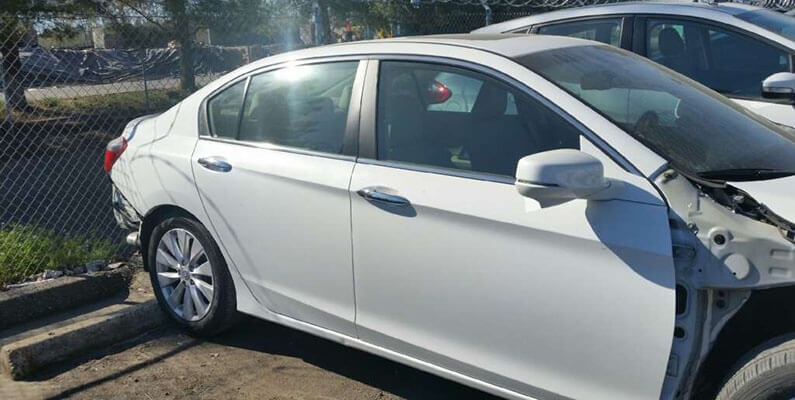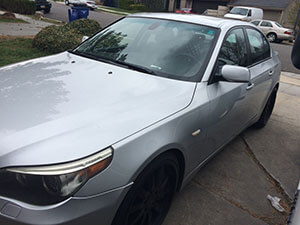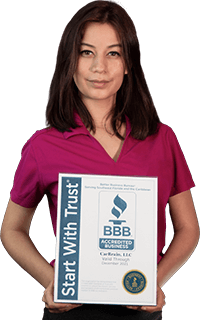What to Do Before a Car Accident
This is an easy one, but it’s often the most overlooked. Know your policy. After getting into a car wreck is not the time to start reading over the fine print of your car insurance policy.
Knowing important things like your deductible or if you have gap coverage can help you to make clearer decisions after an accident. But, it’s the little details, like whether your insurance company will pay to have OEM (Original Equipment Manufacturer)or aftermarket (aka generic) parts installed on your car post collision, which will really save you. So, know your policy.
What To Do Immediately After A Car Accident
First thing’s first… Stay calm. I know it seems obvious now, but seconds after a car careens into you at 65 mph sending you into a concrete barrier, staying calm may not be the first thing popping into your head. Once your head is clearer, then you can start dealing with the accident.
Most importantly, make sure everyone is okay. Start with yourself and your passengers. Then, if it’s safe (you are on a roadway, after all), check on the other vehicle. If anyone is hurt, call 911. If everyone is uninjured and the cars are safely movable, turn on your hazards and move the mouth of traffic. The last thing you want is to have another driver not see you and turn your two car fender bender into a five car pile-up.
Our expert evaluators can help you get an accurate estimate for your cars value, FAST!

Even if no one is hurt, call the police to report the accident. In some states, calling the police is required for even a minor accident. Beyond that, insurance companies love police reports since it’s the job of the police and the insurance companies to determine fault. Try to get the report number and the name & badge number of the police officer.
Exchanging information. Depending on state, people aren’t required to give you their contact information or insurance info (nor are you required to give it to them). But, it always helps to ask. At minimum, get their license plate number and the color, make & model of their car.
Take photos of your car, the other cars involved, everyone’s license plates, location identifiers and the entire accident scene. Talk to witnesses. If possible, get their names and contact information. If any witnesses are willing to stay to speak with the police, all the better. Very important, never admit fault. Don’t say, “My fault. I didn’t see you.” Also, never sign anything unless it’s coming from the police or YOUR insurance representative.
If it’s a minor accident with no injuries, try to wait for the police. If it’s just a fender bender with no injuries, the police may not come. If that’s the case, don’t be the first to leave. Should the accident be a serious one or if there are injuries, definitely wait for the police to arrive. If your car isn’t drivable and needs to be towed, it’s going to a tow lot. Before your car leaves, take out any personal items. Once it reaches a tow lot, it is very difficult to get anything from your car.
Oh yeah. One more thing. Contact the appropriate insurance company. If you’re at fault, file a claim with your insurance. If the other driver is at fault, file a claim with their insurance.
What To Do After An Accident
So now, you have a damaged car from an accident. Keep in mind, a repaired car can lose up to 30% of its pre-accident value. But, if you decide to repair your car, knowing your insurance policy is useful.
First off, get your car out of the tow lot as quickly as you can, as they charge up to $100 per day. Next, repair… You don’t need to use the repair shop your insurance recommends. You can chose your own. However, not all shops are created equal.
Research your body shop. Are they I-Car Gold certified? Have they worked with your type of car before? Do they have good reviews? It’s also a good idea to get multiple estimates if possible. Find out if the estimates are just being done visually or if there is a partial tear-down to look for hidden damage.
Depending on damage, repairing your car may not be the best option. If you own the car outright, you may be able to ask your insurance company for a check and sell your car to damaged car buyers (like DamagedCars.com). If your car is a lease, you may have to have it repaired. If you owe money to a lien holder, you can sell it to DamagedCars.com, but it depends on your auto loan details.
Car accidents are stressful and complicated. By knowing your options and understanding the do’s and don’ts of a car accident, you can save yourself a lot of time, money and aggravation.





